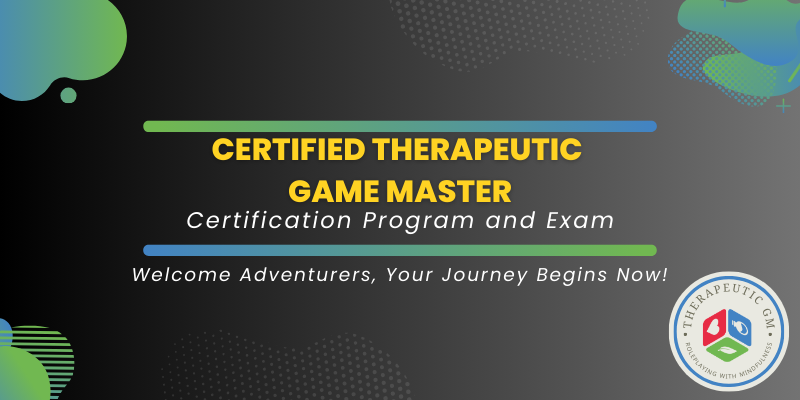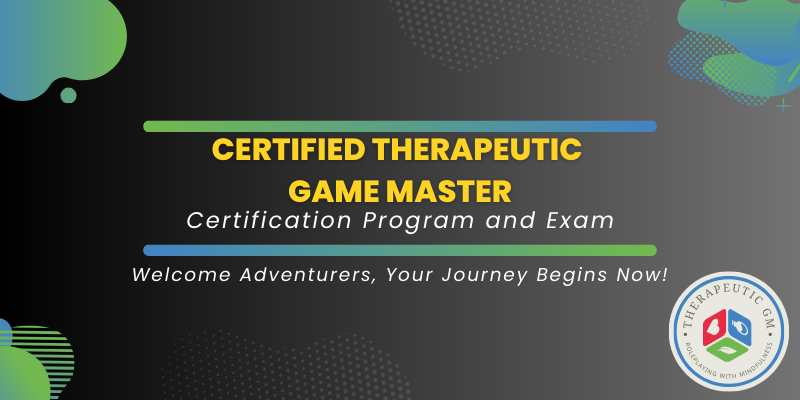- This course closed on .

Overview of the Therapeutic Game Master Program:
The integration of knowledge of human behavior, the hero’s journey through role-playing, generalist game master skills, and evidence-based interventions form the foundation of this certification program. Students are guided through nine weeks of targeted experiences that enhance their understanding of character creation, evidence based practice through theory and modality, session planning, documentation in clinical and non-clinical settings, virtual tabletop integration, and therapeutic encounter building.
The course further requires students to articulate an understanding of applied tabletop role-playing in various private settings, including private practice, group therapy, one-on-one therapy, and non-clinical environments. Students will gain knowledge of core cultural competencies and ethics endorsed by Geek Therapeutics and our accrediting bodies.
Opportunities to challenge and deepen their understanding of individual and group differences are provided throughout the nine-week program. Students are guided through key principles of therapeutic role-playing and taught how to apply these skills in both clinical and non-clinical therapeutic sessions. This certification program also lays the groundwork for the Geek Therapeutics cultural competency exam and the Certification program for therapists and specialists.
The course enhances students’ understanding of cultural and diversity issues within tabletop role-playing games, develops their listening and communication skills—including active listening and critical thinking—and fosters their ability to articulate the contextual aspects of assessment. It also aids in the development of a preliminary professional self within the framework of applied role-playing games.
By the end of the nine weeks, students will have the opportunity to showcase their skills by creating a therapeutic encounter based on the skills learned during the course. This encounter will be facilitated by the student and experienced by their peers. Afterward, students will receive feedback from instructors and colleagues, providing valuable insights for refining their therapeutic encounters.
Learning Objectives:
The learning objectives for the Geek Therapeutics Therapeutic Game Master Program are crafted to provide participants with essential skills and knowledge for integrating therapeutic techniques into tabletop role-playing games (TTRPGs). These objectives are vital as they ensure that learners can blend therapeutic methods with game mechanics, conduct thorough client assessments, and master the role of a Therapeutic Game Master (TGM) to create engaging and effective therapy sessions. Emphasizing evidence-based practices, participants will gain insights into the latest research on therapeutic gaming, ensuring their methods are both credible and effective. The focus on ethical and cultural competency prepares learners to navigate diverse and inclusive environments, fostering respectful and impactful therapy for all clients. Additionally, the program highlights the importance of innovative intervention design, effective communication strategies, and the proficient use of support tools, all of which enhance the therapeutic experience and ensure that therapeutic goals are met. Through a comprehensive understanding of clinical documentation, character analysis, and the biopsychosocial aspects of clients’ lives, participants will be equipped to create personalized and effective treatment plans. Overall, these learning objectives are crucial for developing well-rounded, skilled professionals who can leverage TTRPGs as powerful therapeutic tools, providing innovative and effective treatment to their clients.
Understanding Self Through Biopsychosocial Analysis for Narrative-Based Treatment Planning:
-
- Objective: Participants will develop the ability to understand and analyze the integrated, flawed, ideal, modeled, and masked aspects of the self through a biopsychosocial framework, using these insights for effective narrative-based treatment planning in character creation.
-
- Measurement: Participants will complete a comprehensive biopsychosocial analysis of a client’s character, identifying and discussing the various aspects of self (integrated, flawed, ideal, modeled, and masked). They will then create a narrative-based treatment plan that incorporates these insights, demonstrating how the character’s narrative can be used to address therapeutic goals. This will be assessed
through detailed written reports and presentations evaluated by program instructors.
- Measurement: Participants will complete a comprehensive biopsychosocial analysis of a client’s character, identifying and discussing the various aspects of self (integrated, flawed, ideal, modeled, and masked). They will then create a narrative-based treatment plan that incorporates these insights, demonstrating how the character’s narrative can be used to address therapeutic goals. This will be assessed
Clinical Analysis of Modeled Characters:
-
- Objective: Participants will learn to clinically analyze modeled characters created by clients in TTRPG sessions to inform and enhance individualized treatment plans.
-
- Measurement: Participants will conduct a detailed character analysis exercise, linking character traits, behaviors, and narratives to clinical observations and treatment goals. They will submit a comprehensive report demonstrating how these insights are integrated into a client’s overall treatment plan, which will be evaluated for clinical relevance and depth of analysis.
Research and Evidence-Based Practice:
-
- Objective: Participants will be able to critically evaluate and apply current research on the efficacy of TTRPGs in therapeutic settings, contributing to the evidence base of therapeutic gaming.
-
- Measurement: Participants will complete a research project or literature review on a relevant topic, presenting their findings to peers and program faculty.
Clinical Documentation Mastery:
-
- Objective: Participants will develop a comprehensive understanding of required clinical documentation practices, ensuring accurate, ethical, and legally compliant record-keeping in therapeutic settings using TTRPGs.
-
- Measurement: Participants will complete a series of documentation exercises, including progress notes, treatment plans, and outcome evaluations, which will be reviewed for completeness, accuracy, and adherence to legal and ethical standards.
Integration of Therapeutic Techniques:
-
- Objective: By the end of this program, participants will be able to integrate advanced therapeutic techniques into tabletop role-playing games (TTRPGs) to enhance client engagement and therapeutic outcomes.
-
- Measurement: Participants will demonstrate this by designing and executing a therapy session using TTRPGs, incorporating at least three distinct therapeutic techniques tailored to specific client needs.
Research and Evidence-Based Practice:
-
- Objective: Participants will be able to critically evaluate and apply current research on the efficacy of TTRPGs in therapeutic settings, contributing to the evidence base of therapeutic gaming.
-
- Measurement: Participants will complete a research project or literature review on a relevant topic, presenting their findings to peers and program faculty.
Ethical and Cultural Competency:
-
- Objective: Participants will develop a deep understanding of ethical considerations and cultural competencies in the use of TTRPGs for therapy, ensuring respectful and effective practice across diverse populations.
-
- Measurement: Participants will engage in case studies and role-playing exercises focused on ethical dilemmas and cultural sensitivity, with their responses and strategies evaluated by instructors.
Advanced Client Assessment:
-
- Objective: Participants will develop the ability to conduct comprehensive assessments of clients’ psychological, emotional, and social needs, utilizing both traditional and game-based evaluation tools.
-
- Measurement: Participants will complete a detailed client assessment report, including recommendations for game-based interventions, which will be evaluated by program instructors.
Therapeutic Game Mastery:
-
- Objective: Participants will master the role of a Therapeutic Game Master (TGM), demonstrating advanced skills in game facilitation, narrative development, and adapting game mechanics to therapeutic goals.
-
- Measurement: Participants will be assessed through a practical examination where they must facilitate a TTRPG session, demonstrating proficiency in managing group dynamics, narrative flexibility, and therapeutic direction.
Innovative Intervention Design:
-
- Objective: Participants will create innovative TTRPG-based interventions tailored to specific therapeutic goals, such as anxiety reduction, social skills development, or trauma processing.
-
- Measurement: Participants will design a detailed intervention plan, implement it in a supervised setting, and evaluate its effectiveness through client feedback and outcome measures.
Diversity and Inclusion in Therapeutic TTRPGs:
-
- Objective: Participants will develop the skills to create and facilitate inclusive and culturally sensitive therapeutic tabletop role-playing game (TTRPG) sessions that respect and celebrate diverse client backgrounds and experiences.
-
- Measurement: Participants will design and implement a TTRPG session plan that includes strategies for promoting diversity and inclusion. They will be assessed through peer and instructor feedback on their ability to create a welcoming environment, address cultural nuances, and adapt sessions to meet the needs of a diverse client population.
Effective Communication Strategies for Therapeutic Sessions:
-
- Objective: To equip therapists and Therapeutic Game Masters (TGMs) with effective communication strategies to facilitate therapeutic sessions, enhancing participant engagement, ensuring a supportive environment, and addressing therapeutic goals through clear and empathetic communication.
-
- Measurement: Participants will demonstrate their communication skills by role-playing various therapeutic scenarios, focusing on techniques such as active listening, empathy, and clear articulation of therapeutic goals. Their performance will be evaluated through peer and instructor feedback, as well as self-reflection exercises, to ensure they can effectively foster a supportive and engaging therapeutic environment.
Utilizing Support Tools in Therapeutic TTRPGs:
-
- Objective: To enable therapists and Therapeutic Game Masters (TGMs) to effectively utilize support tools in therapeutic tabletop role-playing games (TTRPGs) to enhance the overall experience, facilitate effective communication, and ensure that therapeutic goals are met. This includes proficiency in employing virtual tabletops, aids for homebound players, resources for in-person players, and techniques like the theater of the mind.
-
- Measurement: Participants will demonstrate their ability to use a variety of support tools by conducting a therapeutic TTRPG session that incorporates at least three different tools or techniques. They will be assessed on their proficiency with virtual tabletops, accommodations for homebound players, resources for in-person players, and the application of theater of the mind techniques. Evaluation will be based on session recordings, peer reviews, and instructor feedback to ensure therapeutic goals are effectively addressed.
Evidence-Based Practices
The program is grounded in evidence-based practices that leverage the therapeutic potential of TTRPGs. These include:
-
- Cognitive Behavioral Therapy (CBT): Applying CBT principles to help clients identify and challenge negative thought patterns and behaviors within the context of gameplay.
-
- Psychodynamic Theory: Exploring character backstories and motivations to gain insights into players’ subconscious mind and past experiences.
-
- Humanistic Approaches: Fostering self-actualization and personal growth through the creation and development of characters that reflect different aspects of the players’ identities.
-
- Behavior Change Methodology: Utilizing behavior change techniques to encourage positive behaviors and personal development during gameplay.
Therapeutic Values
TTRPGs offer numerous therapeutic values, including:
-
- Emotional Expression and Regulation: Players can explore and express emotions safely through their characters, aiding emotional regulation and self-awareness.
-
- Social Skills Development: Collaborative storytelling requires players to communicate, cooperate, and resolve conflicts, enhancing social skills and interpersonal relationships.
-
- Problem-Solving Skills: The challenges and puzzles presented in TTRPGs encourage critical thinking and problem-solving.
-
- Self-Esteem and Confidence: Successfully navigating game scenarios and seeing character growth can boost players’ self-esteem and confidence.
Application in Practice
Applied therapeutic TTRPGs can be utilized in various settings, including private practice, group therapy, one-on-one therapy, and non-clinical environments. Therapists can tailor game scenarios to address specific therapeutic goals, such as anxiety reduction, social skills improvement, and self-confidence building. The program also emphasizes the importance of documenting progress and outcomes to track therapeutic benefits.
The Human Journey and
Collaborative Storytelling
At the heart of therapeutic TTRPGs lies the hero’s journey—a narrative structure that mirrors the human experience of growth and transformation. Through role-playing, individuals embark on adventures, face challenges, and achieve personal victories. This journey fosters resilience, self-discovery, and empowerment.
Collaborative storytelling is a powerful tool in therapy. It allows participants to create shared narratives, fostering a sense of belonging and community. This collaborative process encourages empathy, as players step into the shoes of different characters and perspectives.
The Expansive Nature of Storytelling
The beauty of storytelling in therapeutic TTRPGs is its limitless potential. The only boundary is the imagination of the game master. This expansive nature allows TGMs to create rich, diverse worlds and scenarios that can be tailored to meet the unique needs of each client or group. By harnessing the power of imagination, TGMs can craft therapeutic experiences that are both engaging and transformative.
